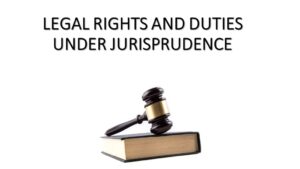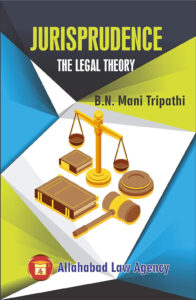Table of Contents
Introduction
Legal Rights and Duties are interrelated, because where there are rights, there are duties, and people are given rights to protect them and fulfill their duties to the state. Duties and rights go hand in hand. Both concepts of rights and duties have been thoroughly discussed under the Jurisprudence.
Meaning of right
Right in the ordinary sense of the term means several things, but it is generally taken to mean the standard of permitted action within a certain sphere. As a legal term, it refers to the standard of conduct permitted by law. Such permitted action of the people is called their legal right. The Legal right should be distinguished from the moral right or natural right.
Legal rights are the interests recognized and protected by law. Violation of this interest is a violation of the law and respect for that is a legal duty. Moral law or natural law refers to the interests recognized and protected by natural justice. Violating this interest would be moral evil and respect, for that is, a sense of moral duty.

Definitions of Rights
According to Salmond:
A legal right is an “interest which is protected and recognized by the rule of law. It is an interest which has its duty and disregard of which is wrong”.
According to Holland:
Holland defines a legal right as the capacity residing in one man to control, with the assent and assistance of the state the actions of others. Holland follows the work given by Austin.
According to Gray:
A legal right is “that power which the man has, to make a person or persons to do or restrains from doing a certain act or acts so far as the power arises from society imposing a legal duty upon the person or persons. He states that the “right is not the interest itself, it is the means to enjoy the interest secured”.
In the case of the State of Rajasthan versus the Union of India, the Supreme Court expressed that “Legal rights in the exact sense are correlatives of legitimate duties and lawful rights are characterized as the interests which the law ensures by forcing duties on different people. In any case, the lawful right in the exacting sense implies right is the insusceptibility from the legal power of another. Immunity is no subjection by any means.”
Rights guaranteed by the Indian Constitution
The Constitution of India has guaranteed certain rights to the citizens of India which are known as Fundamental Rights which is considered to be the most important rights. If these rights get violated then the person has the right to move to the Supreme Court of India or The High Court for enforcing rights.
The fundamental rights guaranteed by the Constitution of India are
- Right to Equality (Article 14)
- Right to freedom (Article 19)
- Right against Exploitation (Articles 23 and 24)
- Right to Freedom of Religion (Article 25)
- Right to Life (Article 21)
- Right to Constitutional Remedies (Article 32)
Theories of Rights
Interest Theory
The interest theory was developed by Rudolf Von Jhering. Rudolf Von Jhering said that legal rights are interests protected by law, and he emphasizes the interests of the people, not the will of the people. The main goal is to protect people’s interests and avoid conflicts between personal interests. You are interested in the life of the community itself, and any laws do not bind you.
Salmond’s opinion: He Supports the theory, but he states that compliance with the theory is an important condition. He criticized the theory of interests on the grounds
that interests are not protected by the state. To confer a legal right, the important thing is to protect the interests and be recognized by the state.

Disclaimer – “This Blog contains affiliate links.
Gray‘s point of view: He said that the theory is partly correct because the lawful right itself is not an interest, it is only to protect the personal interests. He also pointed out that legal rights impose legal obligations on individuals through “state” laws, thereby giving them the right to take certain actions/temperance.
Will Theory
This theory is supported by Kant, Hagel, and Hume. According to this theory, “rights are the inalienable attributes of human will.” The purpose of the law is to achieve freedom of speech. The Subject Matter comes from human will. Austin, Pollock, and Holland defined right as well. John Locke believes that “the foundation of the right is the will of man.”
Puchta believes that legal rights give a person the right over an item, and according to the law, the item can obey the wishes of the person who uses the right.
Duguit’s view: According to him, the basis of law is not subjective will, but objective will. The purpose of the law is to protect only those measures that further support social solidarity. In addition, he found that subjective law theory is a metaphysical abstraction.
Protection Theory
The state grants all rights in the form of laws and regulations, so rights are permitted by government agencies. Therefore, the most significant feature of the legal right is its recognition by the legal system and its judicial enforceability
Classification of Rights
Right in rem and Right in persona: Right in rem is a right that is available to the entire society. Right in persona refers to the rights that individuals can use. An example of a breach of contract: If a breach of contract occurs, the party initiating the lawsuit will bring a lawsuit against the party concerned. Rights in persona are temporary and can become rights in rem. Right in rem is permanent
Personal rights and proprietary rights: Personal rights are rights that respect the owners of the right. Personal rights have no economic value and are related to them i.e., Personal wealth or well-being—for example, the right to dignity, and the right to freedom of speech. Proprietary right is granted to the owner of the property. These rights are rights with a certain currency or economic value and are estates of a person—for example, patent rights, land rights, debts, etc.
Perfect and imperfect rights: Perfect rights are protected and recognized by law, and infringers can be sued. Example: B borrows a loan from A and he needs to repay the loan, and A has the right to demand the loan amount. If B fails to pay, A has the right to file a lawsuit. Incomplete rights refer to rights that are not recognized or protected by law. Example: If the loan expires, you can claim the money, but you cannot execute it.
Principal and Accessory Rights: According to law, the principal right is the most important. This is a basic right granted to people. Accessory rights are indirect rights or security rights. They are not important, but they are considered to be a fundamental right.
Right in Re-aliens and Right in Re-propria: The rights in Re-aliena are available rights against the property of others. One example is the right to an easement. This is the result of inheriting the concept of Jurisprudence from rulers and ministers. The right in the Re-propriais the right related to one’s property, and this right leads to absolute ownership of the property. This is the result of the legal concept of ownership.
Corporal and Incorporeal rights: Both rights are protected by law. Corporal rights are rights over tangible objects or material objects. These rights refer to the rights over objects that can be seen or touched. Incorporeal rights are rights to objects that cannot be seen or touched. Example: the right to reputation.
Legal and Equitable rights: legal rights are protected by common law (ie, English courts). Common law depends on habit and custom. Equitable rights are protected by the equity court or the court of chancellor. The basic principles are natural justice, equity, fairness, and a Clean conscience.
Vested and Contingent Rights: vested rights are rights granted to someone from the beginning. There is no need to do anything to grant someone these rights. It depends on the current situation. Contingent rights are rights granted to individuals on the occurrence or nonoccurrence of certain actions. This right depends on future actions. When a prescribed act occurs, only then the person is granted these rights.
Public and Private Rights: Public right is the right enforced by the state. For example, voting rights, travel rights, etc. Private rights are exercised for personal benefit. Examples: the right to sleep, and the right to drink water.
Concept of Duties
When the right is given to the person then it is assumed that certain duties are also imposed on the person. The right has its correlative duties. There are two kinds of duties it is the obligation of the person to perform his duty when he has a legal duty but in the case of moral duty, he has no obligation. It is at the discretion of an individual. The duties are classified into absolute and relative duty, positive and negative duty, and primary and secondary duty.
Duties under the Constitution of India
1. To safeguard the sovereignty and integrity of India
2. To follow the noble ideals of a national struggle
3. To defend the country and contribute to national service when called 4. To preserve the national heritage of the country;
5. To promote and maintain the harmony of brotherhood amongst the people of India.
6. To protect the dignity of women
7. To protect the natural habitat, including forests, lakes, rivers, and wildlife;
8. To protect public property and to avoid violence;
9. To contribute to the development of the nation in all spheres.
MUST READ
SUICIDE CASE OF ACTRESS JIAH KHAN
HIGHEST-PAID LAWYERS IN INDIA-2023
